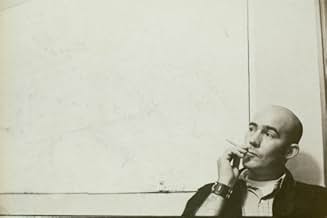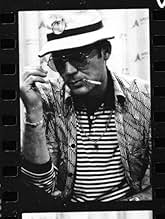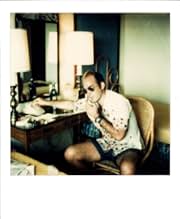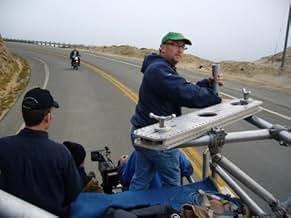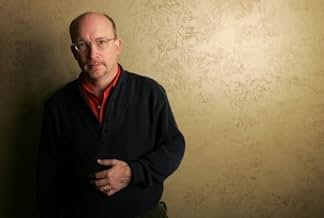CALIFICACIÓN DE IMDb
7.6/10
8.7 k
TU CALIFICACIÓN
Un retrato del difunto periodista gonzo Hunter S. Thompson.Un retrato del difunto periodista gonzo Hunter S. Thompson.Un retrato del difunto periodista gonzo Hunter S. Thompson.
- Dirección
- Guionistas
- Elenco
- Premios
- 1 premio ganado y 5 nominaciones en total
Hunter S. Thompson
- Self
- (material de archivo)
Oscar Acosta
- Self
- (material de archivo)
Muhammad Ali
- Self
- (material de archivo)
Warren Beatty
- Self
- (material de archivo)
- Dirección
- Guionistas
- Todo el elenco y el equipo
- Producción, taquilla y más en IMDbPro
Opiniones destacadas
In the sphere of all the memoirs collected in this post-counter culture portrait of a counter culture icon, narrated by Johnny Depp who played him to some extent in Terry Gilliam's film version of Fear and Loathing In Las Vegas, there was one issue I found noticeably absent: The reality of the unhappiness and suffering of this comic book character of a painfully vague crustacean. The film finds remarkable approach to the people involved in his life, but not even from his two wives do we get a picture of what he was like the inevitable physiological drawbacks caught up with him. He was plainly, intensely addicted to drugs and alcohol, and after a trance-like sleep not much different than passing out at the right time, he would have awakened in a mess of depression and alienation. What did he say on those mornings and afternoons? How did he act?
Of course, it is said during the film that he would drink all day or take drugs and there was no discernible effect. I don't think I buy that. What if it was a front? The main thing is, he wasn't killed by day-to-day simultaneous intakes of alcohol and pills, which can really tear up your head, which are said to cause a likelihood of seizures. He was killed by himself, which he himself scripted and all of his friends totally assumed would happen. He took every reckless risk there was to take, and he, not time or drugs or people, ended it all because his own agenda was dried out. As a journalist, for instance, he reported that at some point in a presidential primary Edward Muskie consumed Ibogaine, a psychoactive drug given out by a "mysterious Brazilian doctor," information which was entirely fictitious yet was actually learned and passed along as truth. Thompson's stunt may have been part of the cause of Muskie's furious irritability throughout the 1972 Florida primary. No other journalist could have carried such a fib, but Thompson was fortified by his myth that he could publish anything.
He was an unpredictable, nearly spellbinding writer, with a savage hilarity in his style. He was never aware of impartiality. In 1972 he backed George McGovern as the Democratic nominee, and no slander was too degraded for him to attach to McGovern's rivals in either party.
This documentary by Alex Gibney is notable, to begin with, for recapitulating to us through how many fires Thompson ran of his very own volition. He rode with the Hells' Angels for a year. Ran for sheriff and lost, but came in very close. Covered the 1972 and 1976 presidential primaries, and had an inexplicable personality, so that for instance McGovern, Tom Wolfe and his wives and son think of him lovingly, but also as enormously cruel and spiteful.
Nobody in the film was around while he was doing things that initially fortified him within the sphere of legend. He became celebrated for writing about that edge of speed going around a bend which you could never pass without killing yourself. He rode loads of edges on his motorcycle, and never got killed. He said persistently that the way he chose to go was by doing the job himself, with a gun, before his success declined. He died that way, using one of his 22 firearms, but he had most definitely declined by that time.
Without doubt he made an impact on his generation like not many other journalists ever have. This documentary is all you could wish for about the man's career and involvement with different people, but there is something at his core that we are inhibited from fully understanding for sure. And it results in you speculating on how so many people liked him when he didn't even seem to have liked himself?
Of course, it is said during the film that he would drink all day or take drugs and there was no discernible effect. I don't think I buy that. What if it was a front? The main thing is, he wasn't killed by day-to-day simultaneous intakes of alcohol and pills, which can really tear up your head, which are said to cause a likelihood of seizures. He was killed by himself, which he himself scripted and all of his friends totally assumed would happen. He took every reckless risk there was to take, and he, not time or drugs or people, ended it all because his own agenda was dried out. As a journalist, for instance, he reported that at some point in a presidential primary Edward Muskie consumed Ibogaine, a psychoactive drug given out by a "mysterious Brazilian doctor," information which was entirely fictitious yet was actually learned and passed along as truth. Thompson's stunt may have been part of the cause of Muskie's furious irritability throughout the 1972 Florida primary. No other journalist could have carried such a fib, but Thompson was fortified by his myth that he could publish anything.
He was an unpredictable, nearly spellbinding writer, with a savage hilarity in his style. He was never aware of impartiality. In 1972 he backed George McGovern as the Democratic nominee, and no slander was too degraded for him to attach to McGovern's rivals in either party.
This documentary by Alex Gibney is notable, to begin with, for recapitulating to us through how many fires Thompson ran of his very own volition. He rode with the Hells' Angels for a year. Ran for sheriff and lost, but came in very close. Covered the 1972 and 1976 presidential primaries, and had an inexplicable personality, so that for instance McGovern, Tom Wolfe and his wives and son think of him lovingly, but also as enormously cruel and spiteful.
Nobody in the film was around while he was doing things that initially fortified him within the sphere of legend. He became celebrated for writing about that edge of speed going around a bend which you could never pass without killing yourself. He rode loads of edges on his motorcycle, and never got killed. He said persistently that the way he chose to go was by doing the job himself, with a gun, before his success declined. He died that way, using one of his 22 firearms, but he had most definitely declined by that time.
Without doubt he made an impact on his generation like not many other journalists ever have. This documentary is all you could wish for about the man's career and involvement with different people, but there is something at his core that we are inhibited from fully understanding for sure. And it results in you speculating on how so many people liked him when he didn't even seem to have liked himself?
No holds barred documentary covering the bizarre life of Dr. Hunter S. Thompson - the father of Gonzo journalism.
This film covers all his classic moments:Hell's Angels, Race for Sheriff of Aspen, Fear and Loathing in Las Vegas and on the Campaign Trail; Muhammad Ali vs. George Foreman, George McGovern, Jimmy Carter, etc. The articles he wrote over several decades for Rolling Stone Magazine are given heavy perspective and no one represented the voice of the turbulent 60's and 70's like Hunter aka Raoul Drake.
Great soundtrack, clips & guest from Johnny Depp to Jimmy Buffett. The loss of a great voice we could really use today!
This film covers all his classic moments:Hell's Angels, Race for Sheriff of Aspen, Fear and Loathing in Las Vegas and on the Campaign Trail; Muhammad Ali vs. George Foreman, George McGovern, Jimmy Carter, etc. The articles he wrote over several decades for Rolling Stone Magazine are given heavy perspective and no one represented the voice of the turbulent 60's and 70's like Hunter aka Raoul Drake.
Great soundtrack, clips & guest from Johnny Depp to Jimmy Buffett. The loss of a great voice we could really use today!
Let's face it, either you loved or hated the life & words of the late Dr.Hunter S.Thompson,you have to admit...he was a piece of work. This documentary attempts to delve into the life (and head)of Thompson (not always with success,but don't let that throw you). The film (narrated by Johnny Depp,who played Thompson in 'Fear & Loathing In Las Vegas',some years back,making him a natural for the job)delves back to his association with the Hells Angels in the mid 1960's (which ended badly),to his being embraced by the whole Hippie counter culture of the later half of that era (along with massive intakes of various drugs),to writing several novels in the early to mid 1970's,to his subsequent downward spiral (in the creative sense),to his eventual death in 2005,by suicide (and his unorthodox memorial service). Hunter Thompson managed to make a name for himself. What I admired was the fact that it goes out of it's way to prove that the sixties was not always the hippie utopia that the baby boomer's make it out to be. What I could have done without was some of the more forgettable music from the 1960's & 1970's (does anybody really want to hear Jimmy Buffet's 'Margaritaville'for the twenty thousandth time?---I sure as hell don't). Apart from that, 'Gonzo:The Life & Work Of Dr.Hunter S. Thompson' will be a "must see" for those who tend to embrace the counter culture, rather than pop culture/trash culture.
Hunter S. Thompson was an often astute commentator of American life, and an always astute commentator of his own mental disintegration, a process driven by his own enthusiastic use of mind-altering drugs; a gun freak who opposed American involvement in Vietnam; and a critic of capitalism who became, pretty much, the living embodiment of his own brand. He also, years after his best work was done, died by shooting himself. This documentary provides insight into his strange journey, which does have a tragic dimension: the values of the life he lived, the adulation he received for living it and the damage it did to him appear in the end inseparable. By the end, he was still celebrated (by new generations of kids who love to get high) but no longer relevant, his final act a desperate (and arguably failed) plea for attention. This documentary tells us much of the story, mostly interestingly, though there are times when it fails to disentangle the process it describes, the overwhelming of man by self-created myth. Still, while it's the prerogative of every generation to feel jaded, I find it hard to imagine another figure like Hunter emerging today, if only because a large part of his quality was that no-one expected him. But the film reminds you of another part as well: he could certainly write.
This is an absorbing doc not only of the good doc but the whole counterculture that he championed in many ways. For all his excessive lifestyle that became almost a parody of the drug culture, he remained a true intellectual and anti-corruption/hypocrisy crusader. He embraced the vision of a new world not ruled by greed and war-mongering, and as early as 1971 proclaimed his great sadness that the movement and the moment of flower power had passed and with it the chance for sane politics. This moment was captured well in "Where the Buffalo Roam" starring Bill Murray as HST, which is given kind of short shrift in this documentary in favor of scenes from "Fear and Loathing Las Vegas" with Johnny Depp as HST. Considering that Depp produced and narrates the film as well as financed the grandiose send-off that Thompson envisioned for himself, it's not strange that Murray's portrayal would be downplayed, as excellent as it was (and Peter Boyle's as the Samoan lawyer.)
All in all, it is a well-balanced account of Thompson's life and work, with many pertinent interviewees like his two wives and son, Jann Wenner of Rolling Stone, Sonny Barger of the Hell's Angels, Jimmy Buffett, George McGovern, Jimmy Carter, Pat Buchanan, Tom Wolfe, and various Aspenites. His passion and wit were undeniable, and his addiction to guns, booze and dope were in many ways forgivable. But his absence in today's disastrous political scene, his voice against war and corruption is sorely missed, and lamented by several of the interviewees. The parallels between Nixon and Bush are easily drawn, and "Gonzo" does this without hammering the point home except to exhort the audience to take up the fight that the Good Doctor waged in a seemingly crazy, but noble and honorable way for most of his life.
All in all, it is a well-balanced account of Thompson's life and work, with many pertinent interviewees like his two wives and son, Jann Wenner of Rolling Stone, Sonny Barger of the Hell's Angels, Jimmy Buffett, George McGovern, Jimmy Carter, Pat Buchanan, Tom Wolfe, and various Aspenites. His passion and wit were undeniable, and his addiction to guns, booze and dope were in many ways forgivable. But his absence in today's disastrous political scene, his voice against war and corruption is sorely missed, and lamented by several of the interviewees. The parallels between Nixon and Bush are easily drawn, and "Gonzo" does this without hammering the point home except to exhort the audience to take up the fight that the Good Doctor waged in a seemingly crazy, but noble and honorable way for most of his life.
¿Sabías que…?
- TriviaAt 1:35 you can see a Richard Nixon mask under the TV. This is a nod to the 1980 movie "Where The Buffalo Roam" starring Bill Murray as Thompson, where he uses that mask to train his dog to attack a scarecrow-like recreation of the former President.
- ErroresWhen the film mentions that Hunter Thompson had a crush on Jefferson Airplane singer Grace Slick, archival footage instead shows the Airplane's first female singer, Signe Anderson.
- ConexionesFeatures To Tell the Truth (1956)
Selecciones populares
Inicia sesión para calificar y agrega a la lista de videos para obtener recomendaciones personalizadas
- How long is Gonzo?Con tecnología de Alexa
Detalles
Taquilla
- Total en EE. UU. y Canadá
- USD 1,252,100
- Fin de semana de estreno en EE. UU. y Canadá
- USD 191,942
- 6 jul 2008
- Total a nivel mundial
- USD 1,491,958
- Tiempo de ejecución
- 2h(120 min)
- Color
- Mezcla de sonido
- Relación de aspecto
- 1.85 : 1
Contribuir a esta página
Sugiere una edición o agrega el contenido que falta



